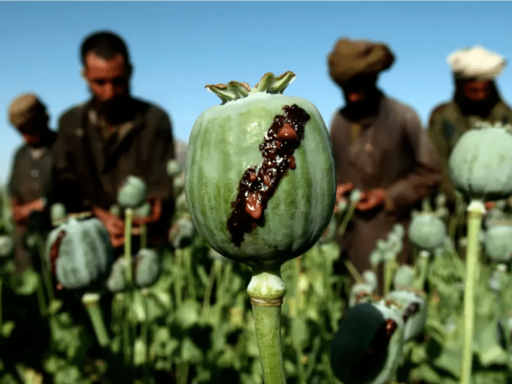Speaking to the Canary, a spokesman from the British Royal Air Force (RAF) denied claims that its planes had engaged in covert airborne missions to drop opium poppy seeds into Afghanistan on behalf of the CIA — America’s principal intelligence service.
No records of RAF C-130s supporting any programme or Foreign National Agency existed he told the Canary.
The denial follows a Washington Post exposé. The report, citing 14 unnamed insiders, describes a bizarre haphazard counter-narcotics plan that proved costly.
The CIA scheme, the outlet stated, formed a secret mission to stamp out the heroin trade — so secret that US allies and security forces didn’t know about it.
Afghan heroin dominated the global market during the US-led war (2001 – 2021) and, as reports alleges, the CIA sought to replace high-strength seeds with low-strength varieties to reduce outputs and phase out the use of herbicides.
Even more bizarrely, the report comes at a time when the US is pursing regime change in Venezuela under the banner of fighting ‘narcoterrorism’. In case you missed the saga, catch up here.
Did Britain droppy the poppy?
The mission was carried out between 2004 and 2015, the paper claims, with at least one break in the middle. Through out the war, occupying militaries and counter-narcotics agencies argued over how to stop the crop.
It continues to state that:
Unbeknownst to almost all of them, the CIA was operating its own secret heroin-eradication program, run by the spy agency’s Crime and Narcotics Center, which was flush with funds during the Afghan war.
“The airdrops of modified poppy seeds began in the autumn of 2004, three people familiar with the program said. The operation was paused at least once and ended about 2015, those familiar with it said”.
A scheme so wild that only the CIA would try it, you may think. Wrong. It seems like the British played a central role. The Washington Post reports:
Clandestine operators, initially using British C-130 aircraft, made nighttime flights to avoid detection, dispersing billions of the specially developed seeds over swaths of Afghanistan’s extensive poppy fields.
The poppy-producing Afghan provinces of Helmand and Nangahar were the main targets.
The seeds are said to have been shipped in at massive expense.
Once the seeds were dropped, the goal was for the plants sprouting from them to cross-fertilize with native plants and become the dominant strain over time, degrading the overall crop’s potency.
Should herbicides be used?
Spokesmen for Bush, Obama and the CIA refused to comment. But leakers point to alleged disagreements between US agencies and then-Afghan President, Hamid Karzai, about spraying the crop. Bush was reportedly in favour, while Karzai, they say, was dead against it. Karzai’s brother, it is worth noting, has long been accused of being connected to the opium trade.
One CIA official said:
There was a sense that it worked. But maybe over time, it worked less well. That the juice wasn’t worth the squeeze.
This is actually an example of creative, out-of-the-box thinking by the agency. … It was dealing with a problem in a non-kinetic, nonmilitary way.
The CIA and British opposed the use of glyphosate, a herbicide, as an alternative, fearing that the elimination of the lucrative crop would cost them Afghan hearts and minds.
U.S. Ambassador to Afghanistan William Wood was keen on the idea. In fact, Wood suggested, as the Washington Post reported, that he would:
sit, clad in a Speedo bathing suit, in a vat of glyphosate in Kabul’s Massoud Circle to prove its safety.
They added that Wood, who previously served as US ambassador to Colombia, was subsequently dubbed “Chemical Bill.”
RAF Wing Commander responds
In an exclusive statement to the Canary, Wing Commander Martin Tinworth, consulting with the RAF Air Historical Branch, firmly denied these claims.
On background, we can confirm that the RAF do not have any records or information relating to RAF C-130s supporting any programme or Foreign National Agency in delivering or sowing GM [genetically-modified] poppy seeds.
Tinworth maintained that the claims were not supported by the historical record and that the military didn’t know where the story had originated from. In conversation with Tinworth, the Canary clarified that Washington Post’s article specified the seeds were not genetically engineered.
For the period specified, Tinworth said there were no drops recorded of any seeds, GM or otherwise.
Featured image via Reuters/Business Insider
By Joe Glenton
From Canary via this RSS feed


